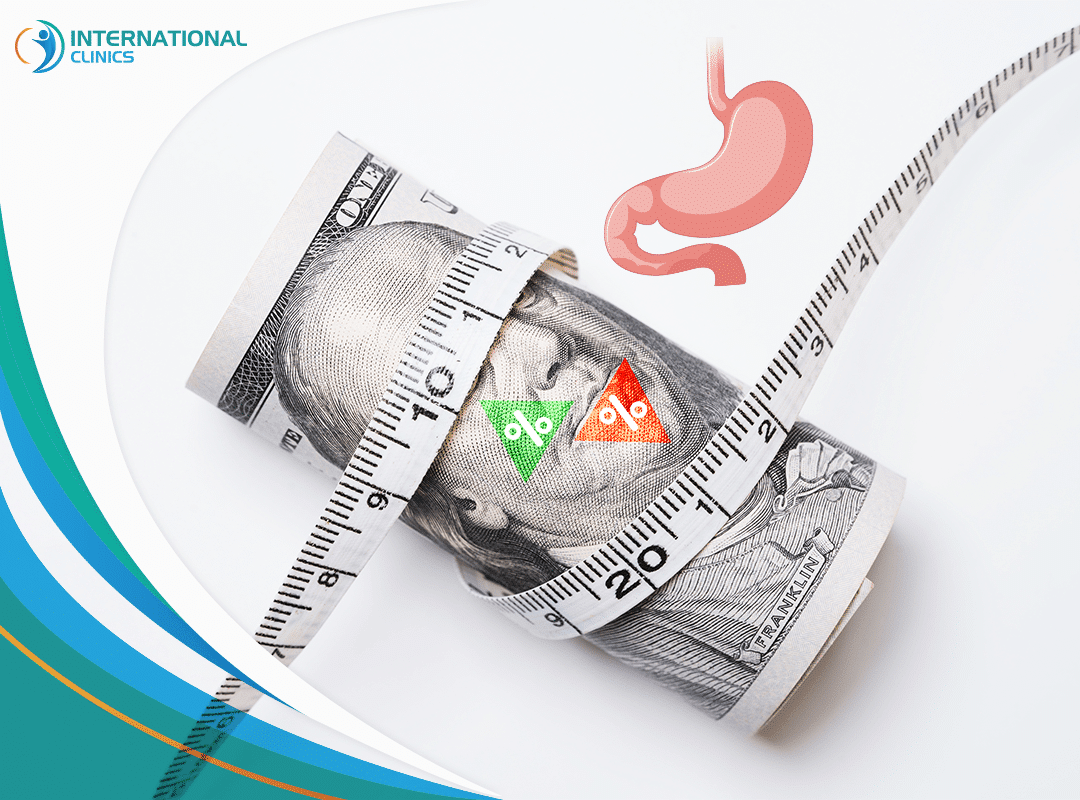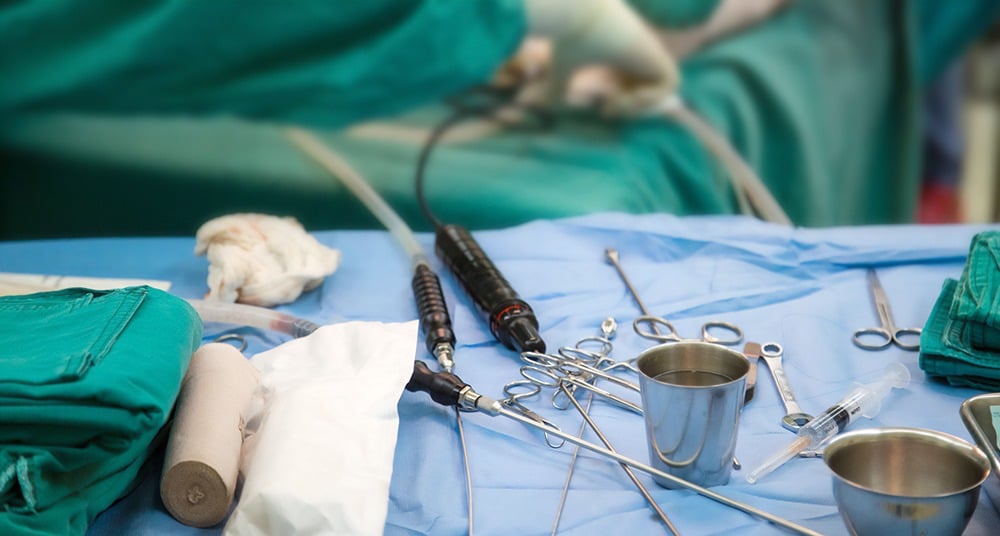




Have you tried countless diets and exercise regimens without success? Well, you're not alone. Many people face the same challenges. Gastric sleeve surgery has gained significant popularity as an effective weight-loss solution in recent years. It is a surgical procedure that involves reducing the size of the stomach to restrict food intake, leading to significant weight loss.
With its minimally invasive approach and promising long-term outcomes, gastric sleeve in Turkey has emerged as a preferred choice for many individuals seeking a sustainable solution to their weight management challenges.
However, one crucial aspect that individuals considering this procedure must consider is the cost involved. In this article, we will explore the factors that influence the cost of gastric sleeve surgery and provide insights into the average expenses involved, helping individuals gain a better understanding of the financial considerations associated with this weight loss solution.

During gastric sleeve surgery, a portion of the stomach is removed to create a smaller pouch or tube-shaped structure. This reduced stomach capacity restricts the amount of food that can be consumed at one time, leading to decreased calorie intake.
By limiting food intake, gastric sleeve surgery in Turkey helps individuals lose weight more effectively than traditional methods such as dieting or exercise alone.
The procedure begins with making small incisions in the abdomen. Through these incisions, a laparoscope (a thin tube with a camera) and surgical instruments are inserted into the body. The surgeon carefully removes approximately 75-85% of the stomach using stapling devices or sutures. The remaining portion of the stomach is reshaped into a long vertical tube or banana-like structure.
Bariatric surgery offers different types of procedures to help individuals achieve weight loss and improve their overall health. Here are some commonly performed types of bariatric surgery:

Gastric sleeve surgery, also known as sleeve gastrectomy, offers several advantages for individuals seeking a weight loss solution. Here are some key advantages:
| Significant Weight Loss | Gastric sleeve surgery has proven to be highly effective in achieving substantial weight loss. Patients can typically expect to lose 60% to 70% of their excess weight within the first year after surgery. |
| Improved Health Outcomes | Beyond weight loss, gastric sleeve surgery often leads to improvements in obesity-related health conditions such as type 2 diabetes, high blood pressure, and sleep apnea. Many patients experience reduced medication usage and an overall enhancement in their quality of life. |
| Reduced Hunger and Appetite | The procedure involves removing a portion of the stomach responsible for producing hunger-stimulating hormones. As a result, patients experience a significant reduction in hunger and appetite, making it easier to adhere to a healthier diet and portion control. |
| Fewer Restrictions on Food Choices | Unlike some other weight loss surgeries, gastric sleeve surgery does not involve rerouting or bypassing the intestines. Therefore, patients can typically eat a wider range of foods while still achieving weight loss goals, albeit in smaller portions. |
| Minimally Invasive Procedure | Gastric sleeve surgery is usually performed laparoscopically, using small incisions, specialized instruments, and a tiny camera. This approach offers benefits such as reduced scarring, shorter recovery time, and a lower risk of complications compared to traditional open surgery. |
| Faster Recovery | The recovery period after gastric sleeve surgery is typically shorter compared to more extensive weight loss procedures. Patients often experience a quicker return to normal activities and can begin exercising and pursuing an active lifestyle relatively soon after surgery. |
Discover: gastric sleeve 10 years later
The average cost of gastric sleeve surgery in the United States ranges from $16,000 to $20,000. However, it's essential to note that this is just an estimate and prices can vary depending on various factors such as location and individual circumstances. Gastric sleeve cost in Turkey is far lower than in the United States or any other country in the North.
For example, undergoing gastric sleeve surgery in a developed country like the United States may be more expensive compared to other countries with lower healthcare costs.

When considering obesity surgery in Turkey or any country, it's important to take into account various factors that can affect the overall cost.
Beyond the procedure itself, there are several additional expenses that you should be aware of to ensure you have a comprehensive understanding of the financial implications. Let's delve into these factors and explore how they can impact the total expense.
Check with your health insurance provider to determine if gastric sleeve surgery is covered under your plan. Some insurance companies may cover the procedure partially or in full, especially if it is deemed medically necessary due to obesity-related health issues.
If you are unable to pay for the surgery upfront, many hospitals and clinics offer financing options. These can help you spread out the cost over time through monthly installments.
If you live in an area where the cost of gastric sleeve surgery is higher, it might be worth considering traveling to another location where prices are more affordable. However, remember to factor in travel expenses such as transportation, accommodation, and meals when calculating the overall cost.
The fees associated with these services vary depending on various factors such as your location and specific healthcare provider. It is advisable to consult with your surgeon or hospital beforehand to obtain a clear estimate of these expenses.
The occurrence of complications or the need for additional procedures can significantly impact both the recovery process and the total expense associated with gastric sleeve surgery. These complications can range from minor issues such as infection or bleeding to more serious concerns like leaks from staple lines or blood clots.
For instance, if a leak occurs along the staple line during surgery, an emergency surgical intervention called revisional surgery may be required to repair it. Similarly, if blood clots develop in the legs (deep vein thrombosis), treatment with blood thinners or even surgical intervention might be necessary.
The good news is that some health insurance plans do cover gastric sleeve surgery, but it's important to understand that coverage can vary among insurance providers and policies. Let's dive into the details to help you navigate this aspect of your weight loss journey.
There are various financing options available to help make this life-changing procedure more affordable. From medical loans to payment plans, you have choices that can ease the financial burden and make your weight loss goals a reality.
One popular option for financing gastric sleeve surgery is through medical loans. Companies like CareCredit specialize in providing healthcare financing, including bariatric procedures. With a medical loan, you can borrow the necessary funds upfront and then repay them over time with manageable monthly installments.
Medical loans offer several advantages. Firstly, they allow you to spread out the cost of your gastric sleeve surgery, making it more budget-friendly. These loans often come with competitive interest rates and flexible repayment terms tailored to your financial situation.
Another alternative for covering gastric sleeve surgery costs is through payment plans offered by hospitals or clinics. These plans divide the total expense of the procedure into smaller monthly payments that fit within your budget.
Payment plans are an excellent choice if you prefer dealing directly with your healthcare provider rather than taking out a loan from a third-party lender. Many hospitals understand that not everyone can pay for their treatment upfront and are willing to work with patients to create personalized payment arrangements.
In addition to medical loans and payment plans, some hospitals offer financial assistance programs specifically designed for self-pay patients seeking bariatric surgeries like gastric sleeve procedures. These programs aim to provide discounts or reduced rates based on income levels or other qualifying criteria.
To take advantage of these programs, individuals typically need to meet certain eligibility requirements and go through an application process. If approved, you may receive a significant reduction in the overall cost of your gastric sleeve surgery, making it more accessible and affordable.
Before embarking on your gastric sleeve journey, it's crucial to thoroughly research and explore different financing options available to you. By doing so, you can make an informed decision that aligns with your financial circumstances and goals.
Consider the following steps when researching financing options for gastric sleeve surgery:

When considering weight loss surgery, it's essential to understand the different options available. Here's a comparison of gastric sleeve surgery with other commonly performed weight loss procedures:
| Procedure | Gastric Sleeve Surgery | Gastric Bypass | Gastric Banding |
|---|---|---|---|
| Surgical Technique | Removal of a portion of the stomach, creating a smaller stomach pouch | Stomach divided into a small upper pouch and a larger lower stomach pouch | Placement of an adjustable band around the stomach to restrict food intake |
| Weight Loss Potential | Significant weight loss of 60% to 70% of excess weight | Significant weight loss of 60% to 80% of excess weight | Moderate weight loss of 40% to 50% of excess weight |
| Effect on Hunger and Appetite | Reduced hunger and appetite | Reduced hunger and appetite | May not affect hunger and appetite |
| Impact on Nutritional Intake | Reduced food intake, but patients can typically eat a wider variety of foods | Reduced food intake, but absorption of certain nutrients may be affected | No impact on food intake |
| Surgical Complexity | Moderately complex procedure | Complex procedure involving rerouting of the intestines | Relatively simple procedure involving placement of a band around the stomach |
| Short-Term and Long-Term Risks | Fewer short-term and long-term risks | More potential for complications | Fewer risks compared to gastric bypass |
| Reversibility | Irreversible | Reversible | Reversible |
| Impact on Obesity-Related | Significant improvement | Significant improvement | Moderate improvement |
Gastric sleeve surgery costs can vary significantly from state to state in the United States. It's important for patients considering this procedure to understand that the price tag associated with it can change depending on where they live. Certain states have higher healthcare costs overall, which naturally leads to higher surgical expenses.
One of the most crucial steps is researching local prices. Patients should take the time to gather information about how much this procedure typically costs in their specific state. By doing so, they can gain a better understanding of what to expect financially and make informed decisions about their healthcare.
Several factors contribute to the variations in gastric sleeve surgery costs across different states:

If you're considering weight loss surgery but are concerned about the cost, it's important to know that there are alternative options available that can be more budget-friendly. The effectiveness of these alternatives may vary depending on individual circumstances and commitment to the chosen approach. Here's the information presented in a table format:
| Lifestyle Modifications | Balanced and nutritious diet Increased physical activity Portion control |
| Behavioral Therapy | Cognitive-behavioral therapy (CBT) Counseling with a therapist or psychologist |
| Medically Supervised Weight Loss Programs | Regular check-ins with healthcare professionals Nutrition education Personalized meal plans |
| Prescription Medications | Appetite suppressants Fat absorption reducers Metabolism boosters |
| Support Groups and Community Programs | Community-based weight loss programs Peer support and accountability |
| Online Resources and Mobile Apps | Guidance, meal tracking, and exercise routines Accessible at low or no cost |
The cost of bariatric surgery in the USA can vary significantly depending on factors such as the specific type of procedure, geographical location, healthcare facility, surgeon's expertise, and additional services included. It's important to note that the following cost ranges are approximate estimates and can vary:
Gastric Sleeve Surgery: Cost Range: $10,000 to $20,000
Gastric Bypass Surgery (Roux-en-Y): Cost Range: $15,000 to $30,000
Gastric Banding (Lap-Band): Cost Range: $12,000 to $20,000
Duodenal Switch: Cost Range: $20,000 to $35,000
Biliopancreatic Diversion with Duodenal Switch (BPD/DS): Cost Range: $25,000 to $40,000
After undergoing gastric sleeve surgery, following a specific postoperative diet plan is crucial for successful recovery. This specialized diet helps patients adjust to their new eating habits and ensures optimal healing. The dietary restrictions may vary depending on individual needs and the recommendations provided by the surgeon.
Following the surgery, patients are typically advised to start with a liquid diet, gradually progressing to pureed foods, soft foods, and eventually solid foods. This gradual transition allows the stomach to heal properly while minimizing discomfort or complications.
The postoperative diet focuses on providing adequate nutrition while limiting portion sizes. Patients are encouraged to consume small, frequent meals throughout the day rather than large meals that can stretch the stomach pouch created during the surgery. High-protein foods such as lean meats, eggs, tofu, and legumes are emphasized in order to support muscle repair and maintain overall health.
While many individuals experience significant weight loss after gastric sleeve surgery alone, some patients may require additional surgical interventions in the future. Regular follow-up appointments allow for monitoring of progress and adjustment of treatment plans if necessary. By staying engaged with their healthcare providers, patients can ensure they are receiving the best possible care and support for their weight loss journey.
In the initial weeks and months post-surgery, weight loss tends to be more rapid due to the restricted capacity of the stomach. patients may witness a substantial drop in their body weight as they adapt to their new eating habits and dietary restrictions. It's not uncommon for individuals to lose up to 30% or more of their excess weight within just a few months after gastric sleeve surgery.
Factors such as body composition, metabolism, adherence to lifestyle changes, age, gender, pre-existing medical conditions, and genetic predispositions can also impact an individual's rate of weight loss. Therefore, it's crucial not to compare your progress with others but rather focus on your own personal journey towards better health.

The duration of an inpatient stay can vary depending on individual health conditions and the complexity of the surgery performed. Patients with pre-existing health issues may require more extensive monitoring and care during their recovery period. Therefore these extended services contribute to increased expenses.
On the other hand, outpatient facilities offer a more cost-effective alternative for individuals seeking gastric sleeve surgery. These centers allow patients to undergo their procedure and return home on the same day without requiring an overnight stay.
To give you a better understanding of the cost differences between these two options, let's compare some price estimates:
These figures are approximate and can vary depending on various factors such as location, healthcare provider, and specific patient requirements.
In conclusion, bariatric surgery offers a range of effective weight loss solutions for individuals struggling with obesity and related health conditions. Understanding the financial implications of bariatric surgery is crucial for individuals considering these procedures. It is essential for patients to research and obtain detailed cost estimates from healthcare providers to plan for the financial aspects effectively.
For those seeking more affordable alternatives to bariatric surgery, lifestyle modifications, behavioral therapy, medically supervised weight loss programs, prescription medications, support groups, and online resources can provide valuable assistance in achieving weight loss goals.
Ultimately, the decision to undergo bariatric surgery or pursue alternative weight loss approaches should be based on individual health needs, preferences, and medical advice. Consulting with a healthcare professional or a bariatric surgeon can help individuals make informed decisions tailored to their specific circumstances, leading to a successful weight loss journey and improved overall well-being.

Read more: Obesity surgeries cost in Turkey
Health insurance coverage for gastric sleeve surgery varies among providers and policies. Some insurance plans do offer coverage for all or part of the costs associated with this procedure. It's important to review your policy or consult with your provider to understand what coverage may be available to you.
If you don't have insurance coverage or inadequate coverage for gastric sleeve surgery costs, there are financing options available. Many clinics offer payment plans or have partnerships with financial institutions that provide loans specifically designed for medical procedures like bariatric surgeries.
Yes! Gastric sleeve surgery is not the only option for weight loss. There are other affordable alternatives such as diet and exercise programs, medication management, and lifestyle modifications. Consulting with a healthcare professional can help you explore these options and determine which approach aligns best with your goals.
Yes, there are variations in gastric sleeve surgery costs across different states within the United States. Factors such as local market dynamics and regional healthcare infrastructure contribute to these differences. Researching state-by-state variations can help you identify potential cost savings if you are willing to travel for your procedure.
In addition to the basic surgical costs, there may be additional factors that can impact the overall cost of gastric sleeve surgery. These include pre-operative consultations, post-operative follow-ups, and potential complications that may require further medical attention. It's important to consider these factors when budgeting for the procedure.
The editorial team of International Clinics
Our medical consultants are available around the clock to answer your questions, completely free of charge.